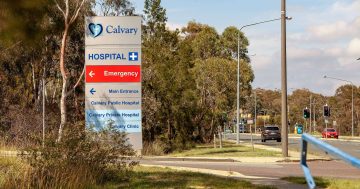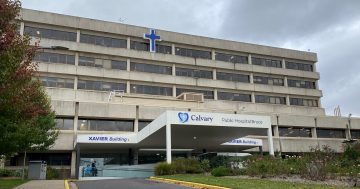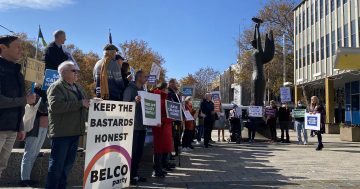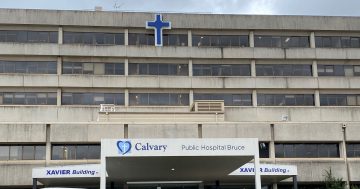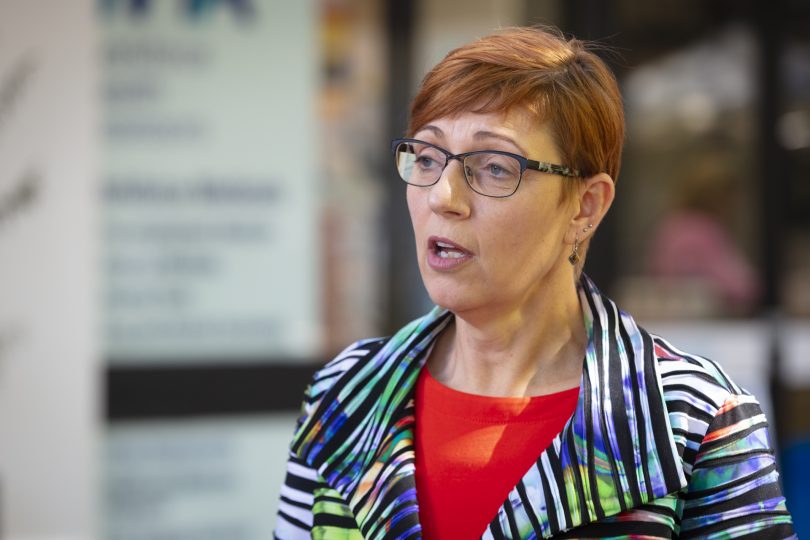
Health Minister Rachel Stephen-Smith says the Calvary takeover is necessary to meet the Territory’s healthcare needs. Photo: Thomas Lucraft.
The waters are getting very muddy indeed as the ACT Government pushes ahead with its plans to compulsorily acquire Calvary Public Hospital at Bruce.
This week, legislation to acquire the hospital passed in the Legislative Assembly, unscrutinised by committee process, and Calvary Health announced it will take legal action over the termination of its 76-year lease arrangements.
The Catholic Church has decried the “existential” threat to faith-based care providers, and members of the Australian Christian Lobby have been protesting loudly at the Assembly, painting the takeover as a threat to religious freedom in the Territory.
But the real risk here is sovereign. This dispute is all about business, not religion.
It’s an easy error to make, especially if you look at the timing of the announcement, coupled with the Assembly’s recent standing committee inquiry into the Territory’s abortion and reproductive choices
The committee’s report, released in April, labelled Calvary’s “overriding religious ethos” as “problematic”, citing a submission to the inquiry from a woman who had claimed she had been denied a dilation and curettage (D&C) procedure at the hospital after suffering an incomplete miscarriage.
She’d told the inquiry that because the procedure could be used for abortions, Calvary Public Hospital had “refused” to perform it.
Region has made multiple requests to committee chair MLA Johnathan Davies to clarify whether the woman gave direct evidence to the committee of being turned away from the hospital or simply believed she could not access care.
We’ve been told that as chair, Mr Davies cannot release that information and requests must be made to the inquiry’s secretary, Dr Adele Chenoweth.
A D&C is a common medical procedure that can be required for many reasons and is sometimes an emergency. Calvary has repeatedly said it would not inquire whether a woman had undergone a termination before offering her treatment and has no record of this happening.
Calvary does not perform abortions – but neither do any of the Territory’s other hospitals, with rare medically indicated exceptions that are usually tragic in nature.
Abortion in the ACT takes place safely and with robust protections at the MSI clinic in Moore St, where the Territory government has made commendable efforts to protect women from being harassed by protestors so they can access legal healthcare. The abortion pill is provided by some GPs.
The ACT is the first and only jurisdiction in Australia where abortion is now available at no cost, protecting the rights of vulnerable women to have control over their own bodies and their reproductive future.
It’s not a perfect situation by any means. There should be more than one abortion clinic in the ACT, and there are reports of women being forced to seek surgical abortions or even access to the abortion pill in Queanbeyan.
But that is an issue for the Minister and ACT Health to address, along with many other ongoing problems.
So why is the Calvary takeover constantly linked to reproductive issues and religious rights?
Could it be because this is an easier strategy to run on all sides of the debate? Allowing people to range themselves on the side of reproductive freedom or religious freedom is emotional, values-laden stuff with plenty of touchpoints from recent, divisive national debates.
It fires up everyone, from passionate advocates for women’s rights to ardent religious campaigners. But neither religious freedom nor abortion access are under threat in the ACT.
The central issue is the ACT Government’s entitlement to end a longstanding commercial arrangement with a private provider who had not breached contract conditions.
This will be the substance of the legal challenge. This is what will be decided in the courts, with its implications for business in the ACT and access to healthcare for a rapidly growing population.












